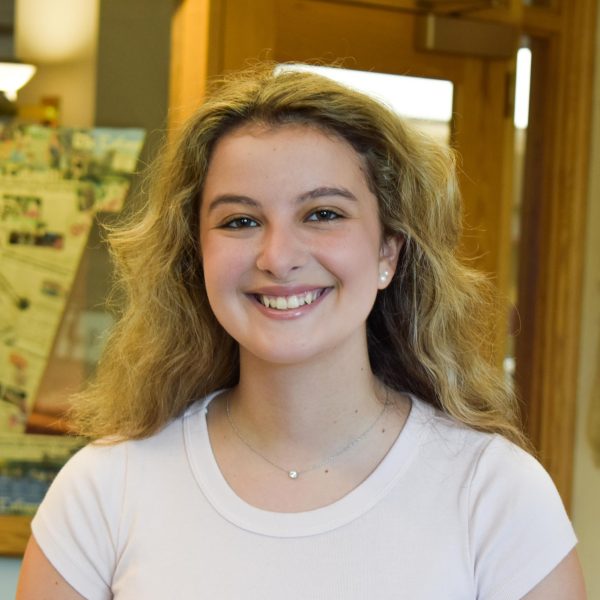Prepare to be transported to 1930s Berlin through the Marquis Players’ dazzling performance of “Cabaret.”
Set during the dark years leading up to World War II, “Cabaret” introduces audiences to the lively Kit Kat Club and its coterie of dancing personalities. Backed by a live orchestra — which notably includes a banjo and an accordion — the score’s arrangement is immersive and spellbinding.
The leading part of the Emcee is embodied by Liam Thompson ’24 with a mastery of the role akin to previous Emcee actors Joel Grey and Alan Cumming. Thompson not only embodies his role; he is the ringleader of the show and every other dancer follows his lead as he struts around the stage brimming with confidence and appeal. Equal parts charismatic and flamboyant, Alex Thurtle ’24 brings their own brand of playfulness as the fiery Sally Bowles, the headlining British entertainer of the Kit Kat Club.
When Thompson and Thurtle team up for a number in the Kit Kat Club such as “Money,” they are beyond dynamic and the best duo in the entire show. One of the more poignant moments of the show is Thurtle’s emotional ballad, “Maybe This Time,” which commands the audience’s attention, with their rich yet delicate vocals pairing perfectly with the live band, a stand-out number in the show.
Standing out from the rest of the ensemble are the Kit Kat Girls, consisting of Rosie, Lulu, Frenchie, Texas, Fritzie and Helga, who are played by Charlotte Farrelly ‘26, Kenzie Polgreen ‘25, Kelsie Bouyer ‘26, Carly Johnson ‘24, Simara Reynoso ‘27 and Zoe Sarr ‘26, respectively. Backing up Sally in numbers such as “Don’t Tell Mama,” the group’s athleticism and magnetism is apparent.
The use of lighting is creative and attention-grabbing, showing how the tone of the show changes as the plot progresses. In act one, red lights give the world of Berlin a moody and sensual tone. However, as the show progresses, World War II does as well, and the red lighting that once bathed the stage in “Don’t Tell Mama” comes to signify the increasing influence of the Nazi Party.
“Cabaret” is full of motion, whether through the frivolous dancers at the Kit Kat Club, or through the well-timed pacing of the relationship between Bowles and American writer Clifford Bradshaw, played by Dean Tracey ’27. There are no slow moments – time literally rushes by in “Cabaret,” and the cast utilizes every single second of it.
The talented cast will perform twice more: tonight at 7:30 p.m. and tomorrow at 2 p.m. Check to see if tickets are still available at lafayette.universitytickets.com.
Correction 4/13/2024: A previous version of this article implied that “Cabaret” was set during World War II. It is set in the lead-up to World War II.
























































































































Jeff R • Apr 13, 2024 at 5:33 pm
Great review of a great work performed by a great company of student actors and musicians, but the reviewer, obviously not a history major, should check her facts. It is not set in Berlin “flush against the darkest times of World War II.” Those would come much later. Its setting is rather a decade earlier as the Nazis ominously were rising to power.
Jeff R • Apr 15, 2024 at 3:53 pm
Thank you for changing the review to reflect the historical inaccuracy of the second paragraph as first written. An acknowledgment by the reviewer of the fixed error would have been appropriate.